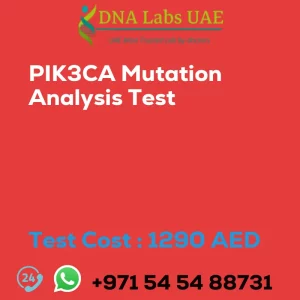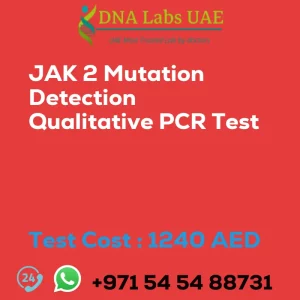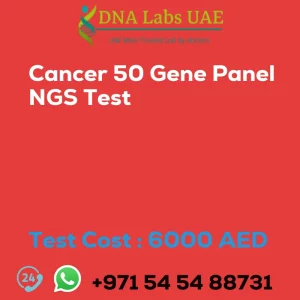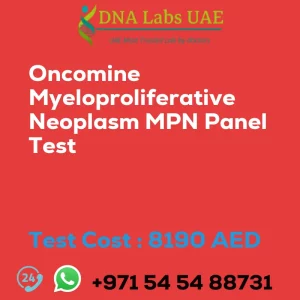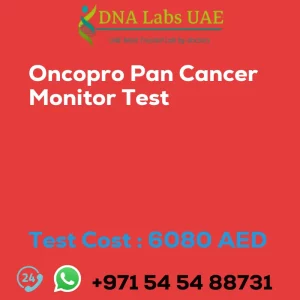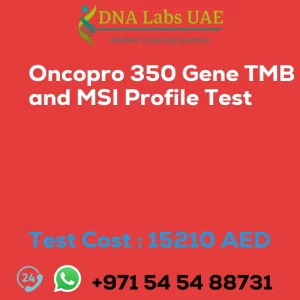C-KIT MUTATION DETECTION PCR Test
At DNA Labs UAE, we offer the C-KIT mutation detection PCR test to detect mutations in the C-KIT gene. This test is commonly used in the diagnosis and treatment of certain types of cancer, such as gastrointestinal stromal tumors (GISTs).
Test Details
The C-KIT mutation detection PCR test utilizes the polymerase chain reaction (PCR) technique to amplify and detect specific DNA sequences within the C-KIT gene. By targeting specific regions of the gene, this test can identify any mutations or changes in the DNA sequence that may be present.
This test is typically performed on a sample of tumor tissue or blood. The sample is processed in our laboratory, and the DNA is extracted. PCR is then used to amplify the specific regions of the C-KIT gene of interest. The amplified DNA is then analyzed to identify any mutations or changes in the gene sequence.
Importance of the Test
The results of the C-KIT mutation detection PCR test can provide valuable information for treatment decisions. Certain mutations in the C-KIT gene may indicate a higher likelihood of response to targeted therapies, such as tyrosine kinase inhibitors. Therefore, identifying these mutations can be crucial in determining the most effective treatment approach for an individual patient.
Test Cost and Components
The C-KIT mutation detection PCR test is priced at 1280.0 AED. The test requires a sample condition of 4 mL (2 mL min.) whole blood in 1 Lavender top (EDTA) tube. It is important to ship the sample refrigerated and not freeze it. Additionally, a duly filled Genomics Clinical Information Requisition Form (Form 20) is mandatory for this test.
Report Delivery and Test Department
The sample for the C-KIT mutation detection PCR test should be submitted on Wednesdays or Saturdays by 11 am. The report will be delivered within 9 working days. This test is conducted in our Molecular Diagnostics department.
Referring Doctor and Pre-Test Information
The referring doctor for the C-KIT mutation detection PCR test is a Hematologist. It is mandatory to fill out the Genomics Clinical Information Requisition Form (Form 20) before conducting this test.
Please note that the C-KIT mutation detection PCR test is a specialized laboratory test that should be performed by trained professionals. The results should be interpreted by a healthcare provider who is familiar with the test and its implications for cancer treatment.
| Test Name | C-KIT MUTATION DETECTION PCR Test |
|---|---|
| Components | |
| Price | 1280.0 AED |
| Sample Condition | 4 mL (2 mL min.) whole blood in 1 Lavender top (EDTA) tube. Ship refrigerated. DO NOT FREEZE. Duly filled Genomics Clinical Information Requisition Form (Form 20) is mandatory. |
| Report Delivery | Sample Wed / Sat by 11 am;Report9 Working days |
| Method | PCR |
| Test type | Leukemia |
| Doctor | Hematologist |
| Test Department: | MOLECULAR DIAGNOSTICS |
| Pre Test Information | Duly filled Genomics Clinical Information Requisition Form (Form 20) is mandatory. |
| Test Details |
The C-KIT mutation detection PCR test is a laboratory test used to detect mutations in the C-KIT gene. The C-KIT gene provides instructions for making a protein called KIT, which plays a role in cell growth and division. Mutations in this gene can lead to the development of certain types of cancer, such as gastrointestinal stromal tumors (GISTs). The PCR (polymerase chain reaction) technique is used in this test to amplify and detect specific DNA sequences within the C-KIT gene. By targeting specific regions of the gene, the test can identify any mutations or changes in the DNA sequence that may be present. The C-KIT mutation detection PCR test is typically performed on a sample of tumor tissue or blood. The sample is processed in the laboratory, and the DNA is extracted. PCR is then used to amplify the specific regions of the C-KIT gene of interest. The amplified DNA is then analyzed to identify any mutations or changes in the gene sequence. The results of the C-KIT mutation detection PCR test can help guide treatment decisions for patients with cancer. Certain mutations in the C-KIT gene may indicate a higher likelihood of response to targeted therapies, such as tyrosine kinase inhibitors. Therefore, identifying these mutations can be important for determining the most effective treatment approach for an individual patient. It is important to note that the C-KIT mutation detection PCR test is a specialized laboratory test that must be performed by trained professionals. The results should be interpreted by a healthcare provider who is familiar with the test and its implications for cancer treatment. |


